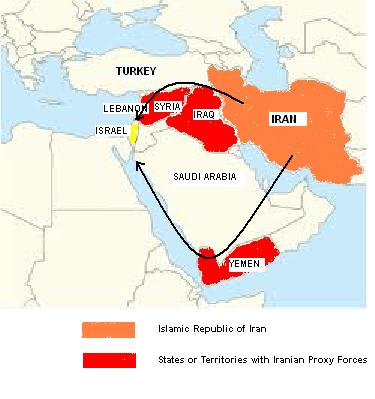Iran’s Geopolitical Pincer

For centuries, military commanders have employed the tactic called a pincer to encircle an opposing force, box it in and then annihilate it with a coordinated attack from all directions. Such a tactic also applies more broadly as a geopolitical manuever to encircle entire nation-states. When one views a map of the changing strategic landscape in the Middle East, it is evident that Iran is conducting a vast geopolitical pincer movement westward. Enclosed within this vast pincer are Saudi Arabia and the State of Israel.
Although Iranian intentions toward Israel (as well as Saudi Arabia) are well known, major news purveyors like The New York Times continue to focus on the conflict between Israel and the Palestinians, as evidenced by the disproportionate number of articles on Israel and the Palestinians at the expense of in-depth coverage of more expansive conflicts in the region.
Despite the immutable nature of the Israeli-Palestinian conflict over the course of many years, major news media continue to amplify relatively minor incidents, routine demonstrations and property vandalism in the West Bank and publish flurries of articles whenever housing construction permits are issued by Israeli authorities in disputed parcels of land surrounding Jerusalem. This hyperfocus on Israel and the West Bank means less resources are available to draw attention to events that threaten to reshape the entire region with potentially catastrophic consequences. An example of a conflict that has not received the attention it deserves is the extension of Iranian influence in Yemen, culminating in the overthrow of the pro-Western government.
Periodically, the CAMERA blog has posted items discussing the importance of events in Yemen. Yemen is the most impoverished Arab state, even though it borders the wealthiest Arab state, Saudi Arabia. It has long been a hotbed of terrorism, spawning what is currently the most dangerous branch [internationally] of Al Qaeda. Its government was a key partner in the war against terrorists. With the fall of the Yemeni government to an Iranian-backed Shiite militia, two major blows have been struck against the West. Al Qaeda will have a freer reign to promote terrorism. But, an even greater risk is the continuing evolution of Iran’s reach in the region.
Some commentators are trying to draw attention to Iranian moves. Charles Krauthammer’s column in the Washington Post, “Iran’s Emerging Empire” discusses what is taking shape in the region, from Lebanon, to Syria and Iraq to Yemen.
In order to completely encircle Israel, Iran still must overcome large geographic obstacles – Saudi Arabia, Egypt and the Mediterranean Sea. But new permutations are conceivable. Saudi Arabia, ruled by a perpetual gerontocracy, may not prove as durable as it currently appears, especially if the United States decides to pursue a policy of disengaging from the region. Although Turkey is a regional Sunni competitor to Shiite Iran, under its current leadership, which has shown a penchant for anti-Israel and anti-Semitic outbursts, it may be open to some form of collaboration with the Iranians against Israel.
It would be helpful to American audiences if the media that focuses so much attention on Israel and the Palestinians would devote more resources and space on their pages to what Krauthammer refers to as the emerging Iranian Empire.
More from SNAPSHOTS
Professor John Quigley Falsely Condemns Israel and U.S. Support in His Syndicated Column
April 30, 2019
John B. Quigley In his widely distributed April syndicated opinion piece mainly about ISIS, the Islamist terrorist entity, John B. Quigley, an Ohio State University law professor, argues that claims of an imminent ISIS resurgence [...]
The New York Times’ Slow Reaction to Hamas Crackdown on Palestinian Protesters
April 4, 2019
The New York Times took a slight jab at Hamas, the terrorist organization that rules the Gaza Strip, in a recent story about Hamas's crackdown on Palestinian protesters who spoke out against its policies in [...]
CNN’s Zakaria Deals With U.S. Proclamation Recognizing Golan As Part Of Israel
April 3, 2019
Fareed Zakaria hosted an eight-minute discussion of the Golan matter at the end of his weekly (weekend) program, “Global Public Square “ (GPS) hour-long Cable News Network (CNN) broadcast. The broadcast, on both CNN and [...]
NY Times Reporter David Halbfinger Editorializes Israel as “Brutal”
March 6, 2019
New York Times Jerusalem bureau chief David Halbfinger Israel, according to the New York Times, is a brute. A March 3 news analysis piece—not an opinion piece—by the newspaper's Jerusalem bureau chief David Halbfinger uses [...]
Palestinian Malevolent Indoctrination Exposed; Mainstream Media Are Indifferent
February 26, 2019
Palestinian Media Watch (PMW), an Israel-based non-governmental organization, analyzes and presents in English to the world the ongoing inflammatory indoctrination of Palestinians in Arabic particularly via Palestinian Authority (PA) television (West Bank). PMW is a [...]
Did WCC Activists Attend A Birthday Party Promoted by Palestinian Extremist Organization?
February 4, 2019
The video is a bit fuzzy and grainy. But the footage of birthday party for Shadi Farar, a 12-year-old Palestinian boy who spent three years in an Israeli jail on charges of intent to murder, [...]


